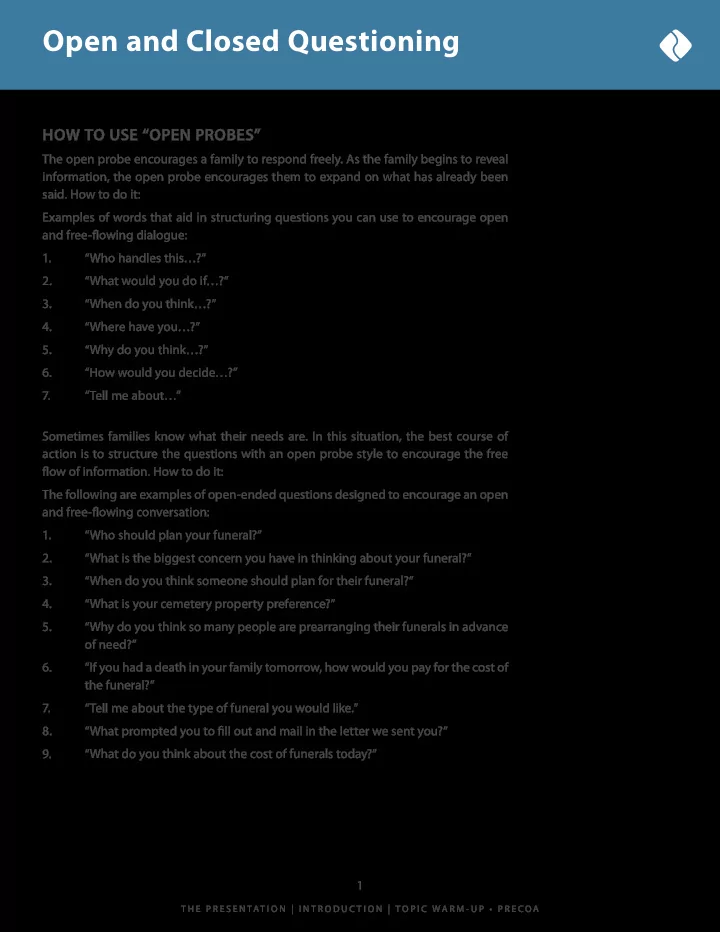

T H E P R E S E N TAT I O N | I N T R O D U C T I O N | T O P I C W A R M - U P • P R E C O A Open and Closed Questioning HOW TO USE “OPEN PROBES” The open probe encourages a family to respond freely. As the family begins to reveal information, the open probe encourages them to expand on what has already been said. How to do it: Examples of words that aid in structuring questions you can use to encourage open and free-fmowing dialogue: 1. “Who handles this…?” 2. “What would you do if…?” 3. “When do you think…?” 4. “Where have you…?” 5. “Why do you think…?” 6. “How would you decide…?” 7. “Tell me about…” Sometimes families know what their needs are. In this situation, the best course of action is to structure the questions with an open probe style to encourage the free fmow of information. How to do it: The following are examples of open-ended questions designed to encourage an open and free-fmowing conversation: 1. “Who should plan your funeral?” 2. “What is the biggest concern you have in thinking about your funeral?” 3. “When do you think someone should plan for their funeral?” 4. “What is your cemetery property preference?” 5. “Why do you think so many people are prearranging their funerals in advance of need?” 6. “If you had a death in your family tomorrow, how would you pay for the cost of the funeral?” 7. “Tell me about the type of funeral you would like.” 8. “What prompted you to fjll out and mail in the letter we sent you?” 9. “What do you think about the cost of funerals today?” 1
T H E P R E S E N TAT I O N | I N T R O D U C T I O N | T O P I C W A R M - U P • P R E C O A Open and Closed Questioning HOW TO USE “CLOSED PROBES” The closed probe limits a family’s response to either a “yes” or “no” answer or to a choice among selections that are supplied. When a family doesn’t freely reveal needs, closed probes are useful in uncovering needs not yet realized. Closed probes are also useful in keeping the families on track who tend to expand too much on open probes. Try to position questions for a positive or favorable reply. How to do it: Examples of key words that may help you identify and use closed probes include: 1. “Do you have…?” 2. “Does your family ever…?” 3. “Have you ever…?” 4. “Has this ever…?” 5. “Are you concerned…?” 6. “Which do you…?” 7. “Is this what…?” The type of probe you use to learn more about the family depends on what the family does or doesn’t say. Most of the time, you will successfully get the family to freely discuss needs, background information and attitudes. If the family is indifgerent or isn’t providing you with information that’s helpful in establishing their needs, then using closed probes is an efgective way to control the conversation and lead the family into sharing more pertinent information. The following are examples of closed-ended questions designed to surface any unrealized needs: 1. “Do you have prearrangements on fjle?” 2. “Does the concept of funeral planning sound benefjcial to your family?” 3. “Have you ever planned a funeral for a loved one?” 4. “Has this topic ever come up with your family before?” 5. “Are you concerned about who will complete your wishes?” 6. “Which of the programs are you most interested in?” 7. “Is this of any interest to you?” 8. “Mr./Mrs. Smith, I know what I’m here to talk about isn’t always a popular subject… Let me ask you…have either of you been involved in making funeral arrangements at the time of a death?” 10. “Are both of your parents still living?” 2
T H E P R E S E N TAT I O N | I N T R O D U C T I O N | T O P I C W A R M - U P • P R E C O A Open and Closed Questioning 11. “When that happened had they made any prearrangements?” 12. “If anything were to happen to the two of you, who would be called upon to take charge of things?” 13. “If it were easy to do, would you feel it important and valuable to your _______ that the two of you write down at least some of your wishes so he/she/they would know how to proceed in the event of an emergency?” 14. “In the event of your death…?” 15. “Have the two of you ever really sat down and shared your thoughts on the subject of death?” 16. “Don’t you feel that would be a great help to ________ considering he/she would be left to take care of these matters?” 17. “If I can ofger you a simple plan, that allows you to record your thoughts and wishes for _______, and results in her/his saving money and feeling secure that he/she honored your wishes and did right by you, wouldn’t that be worth considering? “ 18. “And, if it made sense and was afgordable, wouldn’t you consider adding such a plan to the many things you already have done to help your family?” 19. “Mr./Mrs. Smith, I have dedicated my professional life to helping people put this kind of plan to work for their family, and if you see the value of it, I’d like to help you give your family the benefjts of such a plan tonight.” 20. “How familiar are you with our funeral home?” 21. “Should your children make your funeral arrangements for you or is this something that is your responsibility?” 3
Recommend
More recommend